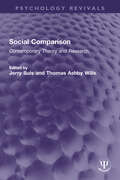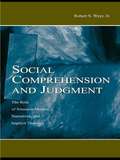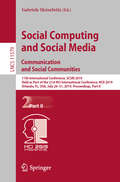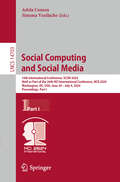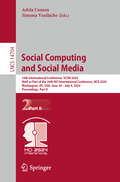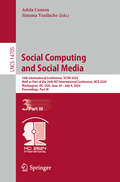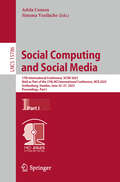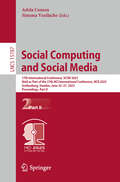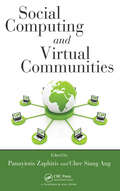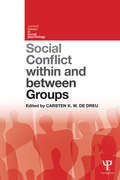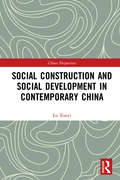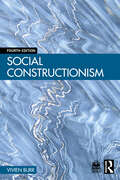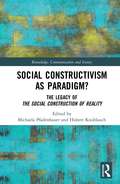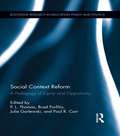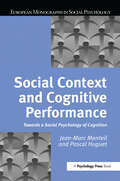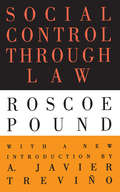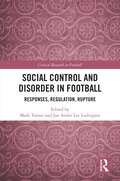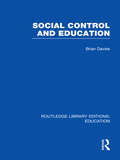- Table View
- List View
Social Comparison: Contemporary Theory and Research (Psychology Revivals)
by Jerry Suls Thomas Ashby WillsAssessment of abilities, opinions, and overall feelings of self-worth, are commonly acknowledged to be influenced by how ones’ attributes compare with those of other people. In contemporary social psychology, this process is known as social comparison or interpersonal comparison. Originally published in 1991, this volume presents the most recent developments in this field of study at the time. As described in the chapters the theory has gone through several iterations, taken on new problems and research paradigms, and reached out to other social-psychological areas of study. Some of this research addresses questions that are logical extensions of Festinger’s theory; some consider questions that derive from entirely different ways of construing the comparison process from Festinger’s original approach. Although all questions are not settled, the work presented here shows how far the original social comparison theory has evolved and suggests where the next insights are likely to be found. Today it can be read in its historical contex
Social Comprehension and Judgment: The Role of Situation Models, Narratives, and Implicit Theories
by Robert S. Wyer, Jr.Written by one of the foremost authorities in social cognition, Social Comprehension and Judgment examines how people process information encountered in their everyday lives. In the book, Dr. Wyer proposes a new theory about the way in which information acquired in everyday life is comprehended and represented in memory, and how it is later used as a basis for judgments and decisions. A major emphasis throughout is on the construction and use of narrative representations of knowledge and the way that visual images influence the comprehension of these narratives and the judgments based on them. The role of affective reactions in this cognitive activity is also discussed. Social Comprehension and Judgment is divided into three sections. Part I provides a conceptual overview by outlining the general theoretical framework focusing on assumptions about the storage and retrieval of information and reviews recent research on the impact of knowledge accessibility on judgments and decisions. Part II deals with the comprehension of information, and examines the role of these processes in impression formation, persuasion, and responses to humor. Part III describes the inferences that are based on information conveyed in social situations. This book is ideal for advanced students and researchers interested in the areas of social cognition or social information processing.
Social Computing and Social Media. Communication and Social Communities: 11th International Conference, SCSM 2019, Held as Part of the 21st HCI International Conference, HCII 2019, Orlando, FL, USA, July 26-31, 2019, Proceedings, Part II (Lecture Notes in Computer Science #11579)
by Gabriele MeiselwitzThis two-volume set LNCS 11578 and 11579 constitutes the refereed proceedings of the 11th International Conference on Social Computing and Social Media, SCSM 2019, held in July 2019 as part of HCI International 2019 in Orlando, FL, USA. HCII 2019 received a total of 5029 submissions, of which 1275 papers and 209 posters were accepted for publication after a careful reviewing process. The 81 papers presented in these two volumes are organized in topical sections named: Social Media Design and Development, Human Behaviour in Social Media, Social Network Analysis, Community Engagement and Social Participation, Computer Mediated Communication, Healthcare Communities, Social Media in Education, Digital Marketing and Consumer Experience.
Social Computing and Social Media: 16th International Conference, SCSM 2024, Held as Part of the 26th HCI International Conference, HCII 2024, Washington, DC, USA, June 29–July 4, 2024, Proceedings, Part I (Lecture Notes in Computer Science #14703)
by Adela Coman Simona VasilacheThis book constitutes the refereed proceedings of the 16th International Conference on Social Computing and Social Media, SCSM 2024, held as part of the 26th HCI International Conference, HCII 2024, which took place in Washington, DC, USA, during June 29–July 4, 2024. The total of 1271 papers and 309 posters included in the HCII 2024 proceedings was carefully reviewed and selected from 5108 submissions. The SCSM 2024 proceedings were organized in the following topical sections: Part I: Designing, developing and evaluating social media; user experience and user behavior in social media; AI and language models in social media; Part II: Social media in learning, education and culture; social media in business and ecommerce; Part III: Computer-mediated communication; social media for community, society and democracy.
Social Computing and Social Media: 16th International Conference, SCSM 2024, Held as Part of the 26th HCI International Conference, HCII 2024, Washington, DC, USA, June 29–July 4, 2024, Proceedings, Part II (Lecture Notes in Computer Science #14704)
by Adela Coman Simona VasilacheThis book constitutes the refereed proceedings of the 16th International Conference on Social Computing and Social Media, SCSM 2024, held as part of the 26th HCI International Conference, HCII 2024, which took place in Washington, DC, USA, during June 29–July 4, 2024. The total of 1271 papers and 309 posters included in the HCII 2024 proceedings was carefully reviewed and selected from 5108 submissions. The SCSM 2024 proceedings were organized in the following topical sections: Part I: Designing, developing and evaluating social media; user experience and user behavior in social media; AI and language models in social media; Part II: Social media in learning, education and culture; social media in business and ecommerce; Part III: Computer-mediated communication; social media for community, society and democracy.
Social Computing and Social Media: 16th International Conference, SCSM 2024, Held as Part of the 26th HCI International Conference, HCII 2024, Washington, DC, USA, June 29–July 4, 2024, Proceedings, Part III (Lecture Notes in Computer Science #14705)
by Adela Coman Simona VasilacheThis book constitutes the refereed proceedings of the 16th International Conference on Social Computing and Social Media, SCSM 2024, held as part of the 26th HCI International Conference, HCII 2024, which took place in Washington, DC, USA, during June 29–July 4, 2024. The total of 1271 papers and 309 posters included in the HCII 2024 proceedings was carefully reviewed and selected from 5108 submissions. The SCSM 2024 proceedings were organized in the following topical sections: Part I: Designing, developing and evaluating social media; user experience and user behavior in social media; AI and language models in social media; Part II: Social media in learning, education and culture; social media in business and ecommerce; Part III: Computer-mediated communication; social media for community, society and democracy.
Social Computing and Social Media: 17th International Conference, SCSM 2025, Held as Part of the 27th HCI International Conference, HCII 2025, Gothenburg, Sweden, June 22–27, 2025, Proceedings, Part I (Lecture Notes in Computer Science #15786)
by Adela Coman Simona VasilacheThis book constitutes the refereed proceedings of the 17th International Conference on Social Computing and Social Media, SCSM 2025, held as part of the 27th HCI International Conference, HCII 2025, which took place in Gothenburg, Sweden, during June 22–27, 2025. A total of 1430 papers and 355 posters included in the HCII 2025 proceedings was carefully reviewed and selected from 7972 submissions. The SCSM 2025 proceedings were organized in the following topical sections- Designing and Developing Social Interactions, Social Media in Learning and Education, Supporting Communication and Psychological Well-Being, User Behavior and Experience in Social Media, and, AI and Social Network Analysis.
Social Computing and Social Media: 17th International Conference, SCSM 2025, Held as Part of the 27th HCI International Conference, HCII 2025, Gothenburg, Sweden, June 22–27, 2025, Proceedings, Part II (Lecture Notes in Computer Science #15787)
by Adela Coman Simona VasilacheThis book constitutes the refereed proceedings of the 17th International Conference on Social Computing and Social Media, SCSM 2025, held as part of the 27th HCI International Conference, HCII 2025, which took place in Gothenburg, Sweden, during June 22–27, 2025. A total of 1430 papers and 355 posters included in the HCII 2025 proceedings was carefully reviewed and selected from 7972 submissions. The SCSM 2025 proceedings were organized in the following topical sections- Designing and Developing Social Interactions, Social Media in Learning and Education, Supporting Communication and Psychological Well-Being, User Behavior and Experience in Social Media, and, AI and Social Network Analysis.
Social Computing and Virtual Communities
by Panayiotis Zaphiris Chee Siang AngDue to the advancement of the Internet, online communities are gaining increasing importance in the research community. Presented from a user's perspective, this book explores the diverse application areas of social computing and online communities. A significant portion of the text focuses on real-world case studies in which user behaviors, social mechanisms, and technological issues are investigated. Drawing from computer science, information systems, and social science, the book takes a multidisciplinary approach to evaluate virtual communities. It is useful for those who construct, moderate, and maintain online communities.
Social Conditions in Britain 1918-1939
by Stephen ConstantineOne popular image of the interwar years portrays the period as a time of depression, deprivation and decay. However, much recent work has tended to take, on balance, a more optimistic view of social conditions. In this pamphlet Dr Constantine examines the basis for such conclusions by reviewing the changing employment porspects for manual and non-manual workers, levels of family expenditure on food, consumer goods and leisure activities, the extent and causes of poverty, the quality of interwar housing and the records of the nation's health. The effects on living standards of demographic change, economic growth, wage levels and government policies are considered. The period is seen as a time of transition, witnessing significant shifts away from older patterns of employment and social conditions towards those characteristic of an affulent mass consumer society. However, there were casualties from this process of accelerated change, and class and regional inequalities remained.
Social Conflict within and between Groups
by Carsten K. W. De DreuIntergroup competition and conflict create pervasive problems in human society, giving rise to such phenomena as prejudice, terrorism, ethnic cleansing, and interstate war. Citizens, policy makers, social workers, schoolteachers, and politicians wrestle with these problems, and with difficult questions these issues pose: What causes conflict to escalate? How should we manage conflict within communities, and also in society at large? Is conflict always bad, or does it have other more beneficial consequences? Social Conflict within and between Groups provides an overview of contemporary research from the social sciences on these questions. It brings together the research output of a number of leading researchers in psychology, management and economics, sociology and political science, and draws on the outcomes of ten prominent research programs conducted over the past five years. The chapters cover a range of fascinating topics, including prejudice and discrimination in multi-ethnic societies, and conflict and negotiation in the field of industrial relations. The authors also consider the possibilities for intervention at the interpersonal, intergroup and societal level. This is the first volume to provide an interdisciplinary overview of the various scientific approaches to studying the origins and consequences of social conflict. It will be of great interest to researchers, graduates and upper-level undergraduate students from across the social and behavioural sciences.
Social Consequences of Internet Use: Access, Involvement, and Interaction
by James E. Katz Ronald E. RiceAuthors explore the impact of the Internet on society from three perspectives: access to Internet technology, involvement with groups and communities through the Internet, and use of the Internet for social interaction and expression.
Social Conservatives and Party Politics in Canada and the United States
by James FarneyThe strength of the Tea Party and Religious Right in the United States, alongside the Harper Conservatives' stance on same-sex marriage and religious freedom in Canada, has many asking whether social conservatism has come to define the right wing of North American politics.In this timely and penetrating book, James Farney provides the first full-length comparison of social conservatism in Canada and the United States from the sexual revolution to the present day. Based on archival research and extensive interviews, it traces the historic relationship between social conservatives and other right-wing groups. Farney illuminates why the American Republican Party was quicker to accept social conservatives as legitimate and valuable allies than the Conservative Party of Canada.This book will be indispensable for understanding why a movement so powerful amongst American conservatives has been distinctively less important in Canada and how the character of Canadian conservatism means it will likely remain so.
Social Construction and Social Development in Contemporary China: Vol. 2 (China Perspectives)
by Xueyi LuWhat is the social structure of Chinese society in the 21st century? How should China address the problem of migrant workers? How can China form a modern society? These key sociological issues are some of the topics this book covers.This book is a collection of the research articles and lectures that Dr. Lu Xueyi, the former Head of the Institute of Sociology at the Chinese Academy of Social Sciences, has published since the 1980s. The author discusses the social structure, social stratification, social construction, and development of contemporary Chinese society. Arguing that the gap between economic and social development has become the major social issue facing modern China, the author advocates paying close attention to the country’s social structure and the growth of the middle class.The book will be of interest to all scholars and students of Sociology and Chinese Studies.
Social Constructionism
by Vivien BurrNow in its third edition, this successful book introduces students to the area of social science theory and research known as social constructionism. Using a variety of examples from everyday experience and from existing research in areas such as personality, sexuality and health, it clearly explains the basic theoretical assumptions of social constructionism. Key debates, such as the nature and status of knowledge, truth, reality and the self are given in-depth analysis in an accessible style. Drawing on a range of empirical studies, the book clearly defines the various different approaches to social constructionist research and explores the theoretical and practical issues involved. While the text is broadly sympathetic to social constructionism, it also adopts a critical perspective to the material, addressing its weaknesses and, in the final chapter, subjecting the theory itself to a more extensive critique. New to this edition: Extended coverage of the relationship between 'mainstream' psychology and social constructionism and how the two fields can engage with each other. An exploration of the rise and popularity of neuroscience and the challenge it poses to social constructionism. New material on the field of psychosocial studies. Updated coverage of existing key issues such as age and sexuality, and inclusion of more recently emerging issues (e.g. status and role of affect). Updated discussion of key social constructionist contributors, with revised references. Updated chapter on research methods, including more on narrative and critical narrative analysis, and personal construct methods. The third edition of Social Constructionism extends and updates the material covered in previous editions and will be an invaluable and informative resource for undergraduate and postgraduate students across the social and behavioural sciences.
Social Constructionism
by Vivien BurrThe fourth edition of this seminal work introduces students to social constructionism. Using a variety of examples from everyday experience and from existing research in areas such as personality, sexuality and health, it clearly explains the basic theoretical assumptions of social constructionism.Drawing on a range of empirical studies, the book clearly defines the various approaches to social constructionist theory and research and explores the theoretical and practical issues they raise. It presents and analyses key debates, such as the nature and status of knowledge, truth, reality, and the self, in an accessible style. The new edition has been updated with relevant and contemporary references to aid understanding of key theoretical and methodological issues. The author additionally utilises new illustrative examples from research and contemporary life, such as the #MeToo movement, BlackLivesMatter, and Post-Truth politics. The updated work has also been expanded to include an extended discussion of affect and embodiment and a number of exercises to help illustrate important concepts.Social Constructionism extends and updates the material covered in previous editions and will be an invaluable and informative resource for undergraduate and postgraduate students of Psychology, Sociology, Education, and other related disciplines.
Social Constructionism, Discourse and Realism (Inquiries in Social Construction)
by Professor Ian PatrickThis book charts a clear and accessible path through some of the key debates in contemporary psychology. Drawing upon the wider critical and discursive turn in the human sciences, Social Constructionism, Discourse and Realism explores comprehensively the many claims about what we can know of `reality' in social constructionist and discursive research in psychology. Relativist versus realist tensions go to the heart of current theoretical and methodological issues, not only within psychology but across the social and human sciences. By mapping the connections between theory, method and politics in social research and placing these within the context of the broader social constructionist and discursive debates, the internationally renowned contributors offer the reader an invaluable survey of the debates.
Social Constructions of Water Quality in South Africa: A case study of the Blesbokspruit River in the Context of Acid Mine Drainage Treatment
by Suvania NaidooThis book details how the water quality of the Blesbokspruit River in Gauteng, South Africa was socially constructed by stakeholders and key individuals in the context of acid mine drainage (AMD) and its treatment. Social constructionism is used as the framing for this research to explain how water is intrinsically social. Findings presented here show that stakeholders are aware that the changes in the physicality of the Blesbokspruit resulted from human interventions and varied uses of the water over the years. Such knowledge, among factors such as the historical context of mining, current coal mining, flows and volumes of water, technology used and processes followed, information and communication, and vested interests influence social constructions of the water quality. What counts as the truth about water varies depending on the individual’s perspective, their purpose, and their individual interests. Further, how one defines water quality influences what treatment processes are preferred in order to improve water quality. The book explains why, for example, a treatment process meant to improve water quality gained a bad reputation by the public because of the South African government’s silo approach. The book explains how these social constructions are entrenched in power relations between stakeholders regarding AMD treatment and illustrates how power was used to influence decisions to improve the water quality of the Blesbokspruit. The case presented in this book offers insights and recommendations for policymakers working in water governance, including means to influence social constructions of water quality and ways to clarify roles and responsibilities in pursuit of improved cooperative government.
Social Constructivism as Paradigm?: The Legacy of The Social Construction of Reality (Knowledge, Communication and Society)
by Hubert Knoblauch Michaela PfadenhauerSocial constructivism is one of the most prominent theoretical approaches in the social sciences. This volume celebrates the 50th anniversary of its first formulation in Peter Berger and Luckmann’s classic foundational text, The Social Construction of Reality. Addressing the work’s contribution to establishing social constructivism as a paradigm and discussing its potential for current questions in social theory, the contributing authors indicate the various cultural understandings and theoretical formulations that exist of social construction, its different fields of research and the promising new directions for future research that it presents in its most recent developments. A study of the importance of a work that established a paradigm in the international sociology of knowledge, this book will appeal to scholars of sociology with interests in social theory, the history of the social sciences and the significance of social constructivism.
Social Context Reform: A Pedagogy of Equity and Opportunity (Routledge Research in Education Policy and Politics #5)
by Julie Gorlewski P. L. Thomas Brad Porfilio Paul R. CarrCurrently, both the status quo of public education and the "No Excuses" Reform policies are identical. The reform offers a popular and compelling narrative based on the meritocracy and rugged individualism myths that are supposed to define American idealism. This volume will refute this ideology by proposing Social Context Reform, a term coined by Paul Thomas which argues for educational change within a larger plan to reform social inequity—such as access to health care, food, higher employment, better wages and job security. Since the accountability era in the early 1980s, policy, public discourse, media coverage, and scholarly works have focused primarily on reforming schools themselves. Here, the evidence that school-only reform does not work is combined with a bold argument to expand the discourse and policy surrounding education reform to include how social, school, and classroom reform must work in unison to achieve goals of democracy, equity, and opportunity both in and through public education. This volume will include a wide variety of essays from leading critical scholars addressing the complex elements of social context reform, all of which address the need to re-conceptualize accountability and to seek equity and opportunity in social and education reform.
Social Context and Cognitive Performance: Towards a Social Psychology of Cognition (European Monographs in Social Psychology)
by Pascal Huguet Jean-Marc MonteilBased on twenty years of research on the social regulation of academic performances, this book offers theoretical and empirical arguments in favour of the inclusion of the social dimension of human beings as essential for their cognitive activities. We all engage in social interactions, compare ourselves with other people, belong to social groups, and are the object of a myriad of categorisations. Not only do such social experiences affect cognition, but they actually determine its form and its content. Several experiments indeed reveal that cognitive performance depends on the relationship between the individual and the social context in which cognition takes place. And this relationship is not forged directly by features of the situation, but rather by personal construals of these features (most notably social comparison). This fact alone justifies granting the individual's social experiences a psychological status and it further strengthens the key idea of this book, namely that the social context only exists through the intervention of cognitive processes of contextualization (producing a "cognitive context of the self") such as those involved in autobiographical memory. A "social psychology of cognition" is suggested, in which the fashionable distinction between cognition and social cognition makes no sense. From this innovative perspective it is indeed more the social nature of the individual rather than that of the object to be processed that defines the social nature of cognition. Well-known phenomena such as social facilitation and social loafing as well as established educational practices are also re-examined from this perspective.
Social Contexts of Radicalization and Violent Extremism in the MENA and Balkans: A Multi-Country Analysis
by Corinne Torrekens Tasnim Chirchi Lurdes Vidal BertranThis volume is a multilevel and multidisciplinary study of radicalization in the Balkans and MENA regions. It takes a dynamic approach embracing the complexity of the social, political and economic contexts under study. Moving away from unidimensional and security-centred research on the topic, each chapter adopts a participatory and inclusive perspective, engaging communities, youth and women as significant stakeholders in building a better understanding of the dynamics of the radicalization of youth in these regions. The multiple case studies presented here cover several macro drivers of radicalization to reveal the interactions and interrelations of individuals with meso-institutions and backgrounds such as family, neighbourhood, school, peer groups, religious and ethnic communities, political parties, etc. Consequently, the volume addresses several gaps in the literature regarding radicalization and violent extremism: it is based on firm empirical evidence; it allows for comparisons between social contexts in one specific country and between countries sharing macro similarities but also differences; it proposes a fruitful dialogue and collaborations between academics, researchers and civil society experts; and, finally, it offers decentralized perspectives on extremism in the West. This volume is an important addition to a topic that is of interest to researchers across the social sciences, and to think tanks and policy makers working on/in these regions.
Social Control Through Law
by Roscoe PoundSocial Control Through Law is remarkable in manner and style. Roscoe Pound shows himself to be a jurist, philosopher, and scientist. For Pound, the subject matter of law involves examining manifestations of human nature which require social control to assert or realize individual expectations. Pound formulates a list of social-ethical principles, with a three-fold purpose. First, they are meant to identify and explain human claims, demands, or interests of a given social order. Second, they express what the majority of individuals in a given society want the law to do. Third, they are meant to guide the courts in applying the law. Pound distinguishes between individual interests, public interests, and social interests. He warns that these three types of interests are overlapping and interdependent and that most claims, demands, and desires can be placed in all three categories. Pound's theory of social interests is crucial to his thinking about law and lies at the conceptual core of sociological jurisprudence. Pound explains that rights unlike interests, are plagued with a multiplicity of meanings. He rejects the idea of rights as being natural or inalienable, and argues that to the contrary, interests are natural. The contemporary significance of the book is aptly demonstrated by the skyrocketing rate of litigation in our postmodern society. As the influence of familial and religious institutions declines, the courts exert an unprecedented degree of control over the public and private lives of most Americans. Law is now the paramount agency of social control. In the new introduction, A. Javier TreviNo outlines the principal aspects of Roscoe Pound's legal philosophy as it is conveyed in several of his books, articles, and addresses, and shows their relationship to Social Control Through Law. This book is an insightful, concise summary of Pound's ideas that, after more than half a century, remains surprisingly fresh and relevant. It will doubtlessly continue to engage jurists, legal theorists, and sociologists for many years to come.
Social Control and Disorder in Football: Responses, Regulation, Rupture (Critical Research in Football)
by Mark Turner Jan Andre Lee LudvigsenThis is the first book to focus on the interrelated issues of social control and disorder in football. It shows how the ‘beautiful game’ illuminates our understanding of the mechanisms and techniques of social control and regulation in contemporary societies. It explores past, new, and continued responses from law enforcers, football associations, sport’s governing bodies, the media, and international organizations to issues of disorder and misbehaviour in football, and how this is highly contested by fans and fan groups. Featuring the work of an international team of leading researchers in football and sport-related studies, the book examines key contemporary trends and topics including fan activism, football-specific legislation, power, violence, fan rivalries, subcultures, the policing of crowds, social sorting, and surveillance. Featuring diverse international cases, including the Qatar World Cup, stadium protests in Portland, Oregon, spectator violence in Polish football, social media and Brazilian football, and sectarianism in Scottish football, the book also looks ahead to what the future holds for the world’s most popular sport. This is an invaluable resource for students, researchers, or the general reader with an interest in the sociology of sport, criminology, sport management, and sports law.
Social Control and Education: Class Inscription And Symbolic Control (Routledge Library Editions: Education)
by Brian DaviesSocial control is a central sociological concept which has generated many influential ‘models’ of man in society. This book examines these major models, and examines the rise of compulsory schooling in Britain and the USA and shows us which aspects of education and social control have been elaborated or neglected in the sociology of education down to the mid 1970s.
